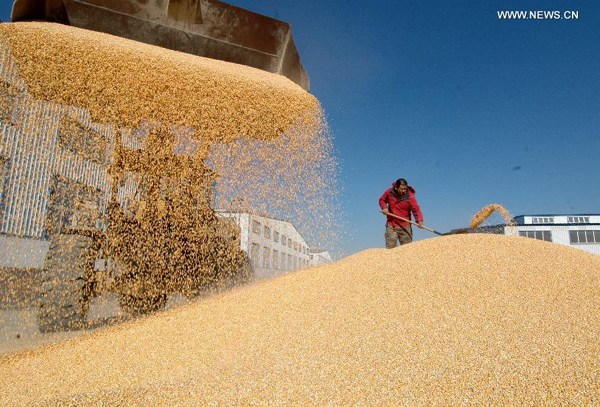
An employee of the Qilihe National Grain Depot airs corn in Yixian county, Jinzhou city, Northeast China's Liaoning province, Nov 13, 2014. (Photo/Xinhua)
Grain authorities have sealed 25,000 metric tons of rice at a warehouse in Liaoning province after it was reported to have bought old rice that it then sold to rice merchants as fresh rice.
Investigators have collected rice samples from the Qingyunbao Central Grain Warehouse in Tieling city and sent them for testing, China News Service reported on Tuesday.
Grain authorities in China are inspecting State grain warehouses this year to root out any irregularities, according to a statement issued by State Administration of Grain on Tuesday.
According to a report by China Central Television last week, Zhao Lijun, manager of a grain processing company in Shenyang, Liaoning province, bought 23,800 metric tons of rice from Qingyunbao Central Grain Warehouse last year through an auction.
However, when the supposed fresh rice was delivered it smelled moldy and its color had changed.
Zhao sent one of her employees to the warehouse to take rice samples for testing, but managers of the warehouse refused to provide any samples, according to the report.
Buying old grain and selling it as new is very common at state warehouses, Zhao told CCTV.
The Chinese government guarantees a minimum price for agricultural products purchase by state owned storages to protect farmers.
Grain reserves are dominated by the State-owned China Grain Reserves Co, which last year had 346 central grain warehouses across China. Each warehouse should rotate out its old storage with new grain purchased from farmers, according to regulations.
The company purchased 125 million tons of grain last year, accounting for about 20 percent of China's grain output, according to China News Service.
China's grain purchase and reserve system needs to be reformed to avoid similar corruption in the business, according to Ma Wenfeng, an agricultural products analyst at CnAgri, a Beijing-based agricultural consultancy firm.
Grain prices in China were lower than the international standards more than 10 years ago and it was necessary to purchase large quantities of grain every year to protect farmers, he said.
But prices have been increasing in recent years, and it has been suggested that reserves be reduced to let the market play a bigger role, he said.
















































